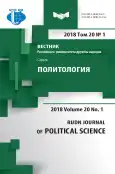Influence of Religion in Internal Politics of Bangladesh
- Authors: Islam M.S.1
-
Affiliations:
- Peoples’ Friendship University of Russia (RUDN University)
- Issue: Vol 20, No 1 (2018)
- Pages: 105-113
- Section: CURRENT PROBLEMS OF POLITICAL SCIENCE
- URL: https://medbiosci.ru/2313-1438/article/view/339980
- DOI: https://doi.org/10.22363/2313-1438-2018-20-1-105-113
- ID: 339980
Cite item
Full Text
Abstract
The study of the relationship between politics and religion is important to understand the current society of Bangladesh. It is believed that the reason for the separation of the Indian subcontinent into two parts: India and Pakistan was a religious factor. East Bengal became part of Pakistan, called East Pakistan. In Pakistan Islam was the state religion, which was reflected in the entire social life of Bengalis. In East Pakistan, most of the people are Bengalis and speak in Bangla, culture, traditions and way of life were historically connected with the peoples of India. In Pakistan, the state language was Urdu. The authorities of west Pakistan pressed the people of East Pakistan to study Urdu in educational institutions, tried to ignore the Bangla language, limiting the activities of newspapers and radio, which caused discontent among the population. A considerable time in educational institutions was devoted to the study of religion. Many decisions of local authorities were adopted and executed on the behalf of Islam. The authorities of Pakistan suppressed the people with this policy by mass repressions. Particularly bloody repressions against the Bengali people were held in 1971. As a result of a popular uprising, armed struggle and the expulsion of troops, this part of Pakistan has become an independent country. In 1972, after the establishment of the People's Republic of Bangladesh, secularism became one of the fundamental principles of the Constitution of Bangladesh. The article analyzes the political process through which religion becomes part of politics, using the historical method of research. Although the Constitution says that religion is separated from the state, but until now religion is considered a very important factor in the politics of Bangladesh.
Keywords
About the authors
Md Sazedul Islam
Peoples’ Friendship University of Russia (RUDN University)
Author for correspondence.
Email: sazid.ul.islam2010@gmail.com
postgraduate student of the Department of Comparative Politics
Mikhlukho-Maklaya, 6, Moscow, Russia, 117198References
- Varka S.G. Ponjatie sekuljarizma i ego teoreticheskie osnovanija. FB.ru. 26.08.2016. Available from: http://fb.ru/article/263413/sekulyarizm---eto-ponyatie-sekulyarizma-i-ego-teoreticheskie-osnovaniya. (In Russ).
- Radugin A.A. Vvedenie v religiovedenie: teorija, istorija i sovremennye religii: kurs lekcij. Moscow: Centr; 2000. 240 p. Available from: https://studfiles.net/preview/4482396/page:40/. (In Russ).
- Amena A.M. Religion, politics and security: The case of Bangladesh. 1984. Available from: apcss.org/../ReligiousRadicalism/PagesfromReligiousRadicalismandSecurityinSouthA.
- Bangladesh Population 2017 (Demographics, Maps, Graphs). 30.09.2017. Available from: worldpopulationreview.com/countries/bangladesh-population/.
- Constitution of the People's Republic of Bangladesh. Available from: bdlaws.minlaw.gov.bd/pdf_part.php?id=367.
- Demographics of Bangladesh. Wikipedia.org. Available from: https://en.wikipedia.org/wiki/ Demographics_of_Bangladesh.
- Lahore resolution. Available from: storyofpakistan.com › Timeline › 1940—1947 › 1940—1944 Events.
- Md Iftakharul I., Kaniz M. Abuse of the religious sentiment to gain political purpose in Bangladesh. IOSR Journal of Humanities and Social Science (IOSR-JHSS). 2013; Vol. 8; 4(Mar-Apr-2013): 15—20. Available from: www.iosrjournals.org/iosr-jhss/papers/Vol8-issue4/ D0841521.pdf?id=6069.
- Riaz A. Future of religion based parties and politics in Bangladesh. Daily bangla newspaper Prothom Alo. 01.06.2013. Available from: www.prothom-alo.com.
- Rock-Singer A. Religion and secularism in the Middle East: a primer. Foreign Policy Research Institute. 25.11.2015. Available from: https://www.fpri.org/../religion-and-secularism-in-the-middl..
- Sayed Eftekhar A. Democracy and Secularism: Bangladesh Perspectives. Protichinta.com. 17.04.2017. Available from: www.protichinta.com/articles/articleDetails/134.
- Ullah M. Religion, secularism and politics. Daily bangla newpaper Jugantor. 25.11.2014. Available from: www.jugantor.com/old/window/2014/11/25/179203.
Supplementary files









